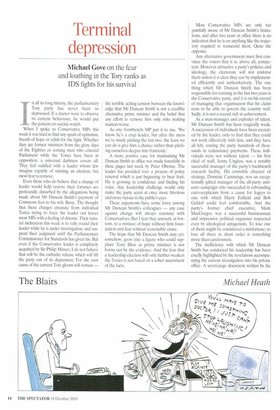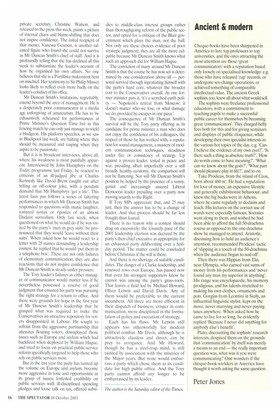Terminal depression
Michael Gove on the fear and loathing in the Tory ranks as IDS fights for his survival In all its long history, the parliamentary Tory party has never been so depressed. If a doctor were to observe its current behaviour, he would put the patient on suicide watch. When I spoke to Conservative MPs this week it was hard to find any spark of optimism, breath of hope or relish for the fight. Whether they are former ministers from the glory days of the Eighties or coming men who entered Parliament while the Tories have been in opposition, a universal darkness covers all. They feel saddled with a leader whom few imagine capable of winning an election, but most fear to remove.
Even those who do believe that a change of leader would help restore their fortunes are profoundly disturbed by the allegations being made about Mr Duncan Smith's payment of Commons fees to his wife Betsy. The thought that these charges emanate from individual Tories trying to force the leader out leaves most MPs with a feeling of distaste. Their natural inclination this week is to rally round their leader while he is under investigation, and suspend their judgment until the Parliamentary Commissioner for Standards has given his. But even if the Conservative leader is completely acquitted by Sir Philip Mawer, I do not believe that will be the cathartic release which will lift the party out of its depression. For the root cause of the current Tory gloom will remain — the terrible aching tension between the knowledge that Mr Duncan Smith is not a credible alternative prime minister and the belief that any effort to remove him only risks making matters worse.
As one frontbench MP put it to me, 'We know he's a crap leader, but after the mess we've made picking the last two, the least we can do is give him a chance rather than pitching ourselves deeper into fratricide.'
A more positive case for maintaining Mr Duncan Smith in office was made forcefully in these pages last week by Peter Obome. The leader has presided over a process of policy renewal which is just beginning to bear fruit. He is growing in confidence and finding his voice. Any leadership challenge would only make the party seem at once more frivolous and more vicious in the public's eyes.
These arguments have some force among Mr Duncan Smith's colleagues — any case against change will always resonate with Conservatives. But I fear they amount, at bottom, to a mixture of hope without firm foundation and fear without reasonable cause.
The hope that Mr Duncan Smith may yet, somehow, grow into a figure who could supplant Tony Blair as prime minister is not borne out by the evidence. And the fear that a leadership election will only further weaken the Tories is not based on a sober assessment of the facts. Most Conservative MPs are only too painfully aware of Mr Duncan Smith's limitations. and after two years in office there is no indication that he is on anything like the trajectory required to transcend them. Quite the opposite.
Any alternative government must first convince the voters that it is, above all, competent. However attractive a party's policies and ideology, the electorate will not endorse them unless it is clear they can be implemented efficiently and authoritatively. The one thing which Mr Duncan Smith has been responsible for running in the last two years is the Conservative party, and it is on his record of managing that organisation that his claim rests to be able to govern the country well. Sadly, it is not a record rich in achievement.
As a man-manager and exploiter of talent, Mr Duncan Smith has been tragically weak. A succession of individuals have been recruited by the leader, only to find that they could not work effectively with him, and they have all left, costing the party hundreds of thousands in redundancy payments. These individuals were not without talent — his first chief of staff, Jenny Ungless, was a notably successful manager of the party's backbench research facility. His erstwhile director of strategy, Dominic Cummings, was an exceptionally gifted manager of the all-party antieuro campaign who succeeded in rebranding euro-scepticism from a cause for fogeys to one with which Harry Enfield and Bob Geldof could feel comfortable. And the party's former chief executive, Mark MacGregor, was a successful businessman and impressive political organiser respected even by ideological antagonists. To lose one of them might be considered a misfortune; to lose all three in short order is something more than carelessness.
The inefficiency with which Mr Duncan Smith has conducted his leadership has been cruelly highlighted by the revelations accompanying the current investigation into his private office. A seven-page document written by his private secretaty Christine Watson, and released to the press this week, paints a picture of internal chaos and blame-shifting that does not inspire confidence. The initial recipient of that memo, Vanessa Gearson, is another talented figure who found she could not survive as Mr Duncan Smith's chief of staff. And it is profoundly telling that she has declined all this week to substantiate the leader's account of how he organised his own affairs. No one believes that she is a Portillista malcontent bent on mischief. Her testimony to Sir Philip Mawer looks likely to reflect even more badly on the leader's conduct of his office.
Mr Duncan Smith's limitations, regrettably, extend beyond the area of management. He is a desperately poor communicator in a media age unforgiving of amateurism. He has to be exhaustively rehearsed for performances at Prime Minister's Question Time but in this fencing match he can only just manage to wield a bludgeon. His platform speeches, as we saw in Blackpool last week, are halting where they should be measured and rasping when they aspire to be passionate.
But it is in broadcast interviews, above all, where his weakness is most painfully apparent. Interviewed by John Humphrys on the Today programme last Friday, he reacted to criticism of an ill-judged jibe at Charles Kennedy like David Brent caught out after telling an off-colour joke, with a petulant demand that Mr Humphrys 'get a life'. This latest faux pas follows a series of faltering performances in which Mr Duncan Smith has responded to questions with manic laughter, tortured syntax or ripostes of an almost Dadaist surrealism. Only last week, when questioned on what he would do if he was visited by the party's 'men in grey suits' he pronounced that they would 'leave without their suits'. When asked how he would react to a letter with 25 names demanding a leadership contest, he replied that he would 'put them in a telephone box'. These are not only failures of elementary communication; they are also reactions that do not inspire confidence that Mr Duncan Smith is steady under pressure.
The Tory leader's failures as either manager or communicator would matter less if he nevertheless possessed a reserve of good judgment that ensured his party was pursuing the right strategy for a return to office. And there were grounds for hope in the first year of Mr Duncan Smith's leadership that he grasped what was required to make the Conservatives an attractive repository for voters disappointed in Labour. He sought to refrain from the aggressive partisanship that alienates floating voters, downplayed those issues such as Europe and asylum which had backfired when deployed by William Hague, and tried to focus on practical public-service reform specifically targeted to help those who rely on public services most.
But in the last year the party has turned up the volume on Europe and asylum, become more aggressive in tone and opportunistic in its grasp of issues, forfeited credibility on public services with ill-disciplined spending pledges and loose talk on tax, offered subsi
dies to middle-class interest groups rather than thoroughgoing reform of the public sector, and opted for a critique of the Blair government which plays the man, not the ball. Not only are these choices evidence of poor strategic judgment; they are all the more culpable because Mr Duncan Smith knows what such an approach did for William Hague.
The conviction of many around Mr Duncan Smith is that the course he has now set is determined by one consideration above all — personal survival through ingratiating himself with the party's hard core, whatever the broader cost to the Conservatives overall. As one former minister puts it, 'it's a scorched earth policy — Napoleon's retreat from Moscow: it doesn't matter who we lose, or what damage we do, provided he escapes in one piece'.
The consequence of Mr Duncan Smith's survival will be the Tory party offering as its candidate for prime minister a man who does not enjoy the confidence of his colleagues, the respect of those he has worked with, a reputation for sound management, a mastery of modern communication techniques, steadiness under fire or consistency of strategy. Up against a proven leader, tested in peace and war, presiding albeit imperfectly over a still broadly healthy economy, the comparison will not be flattering. Nor will Mr Duncan Smith's position be helped by the presence of a sunny. genial and increasingly assured liberal Democrat leader presiding over a party now moving smartly to the Right.
If Tory MPs appreciate that, and 25 may just, then the answer has to be a change of leader. And that process should be far less fraught than feared.
There is no reason why a contest should drag on excessively; the leisurely pace of the 2001 leadership election was decreed by the party's then chief executive as appropriate for an exhausted party deliberating over a holiday period. The matter could be concluded before Christmas if the will is there.
And there is no shortage of suitable candidates. The danger of a Clarke leadership, and renewed rows over Europe, has passed now that even his strongest supporters know he cannot win among the party's grass-roots. That leaves a field led by Michael Howard, Oliver Letwin and David Davis. Any of them would be preferable to the current incumbent. All three are more efficient in their dispatch of business, crisper in communication, more disciplined in the formulation of policy and execution of strategy.
Each has his flaws. Mr Letwin still appears too otherworldly for modern political combat. Mr Davis, although he is attractively classless and direct, can be prey to arrogance. And Mr Howard, though he has a steel-trap mind, is still tainted by association with the miseries of the Major years. But none would embarrass a party which chose them as its candidate for high public office. And the Tory party cannot afford any longer to be embarrassed by its leader.



































































































 Previous page
Previous page